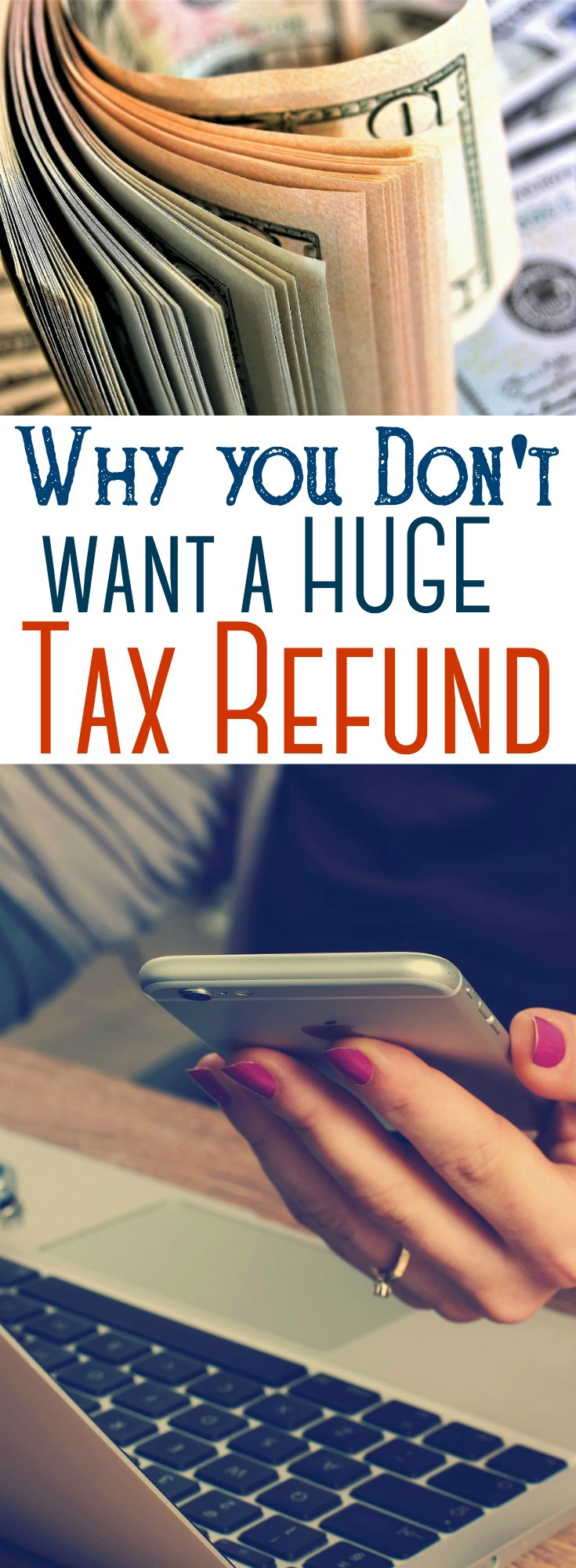
It’s tax time, and while some of you might still be needing to file, others might be relishing in the large tax refund they are going to be getting back. In fact, 75% of Americans get a fat check back from Uncle Sam…
Are you one of those Americans?
If it interests you any, you will appreciate knowing that while some may be pulling out the balloons and confetti as they drool over the next TV they have been eyeing, that getting that huge refund back isn’t something that’s necessarily good.
Every year around this time I see memes pop up on Facebook – some may look at the refund as easy Disney money, while others might have a large television, perhaps a car in mind.
We haven’t gotten refunds in years, and by years I mean now almost 17 years of being married. As a small business owner, it is a little more challenging to plan accordingly to not get that refund.. but it’s possible.
By visiting our accountant quarterly and keeping our expense sheets monitored, we come very close to knowing exactly what we need to pay in as a business without having to mess with a large refund. It’s hard, and requires effort, but it is possible – even from a business perspective.
Why you Don’t Want a Big Tax Refund
The main reason: You have just loaned the U.S. Government your money – and you haven’t been earning interest on that loan.
It’s definitely far from being money smart – especially if you are carrying debt around with you. Perhaps, you are carrying student loans – perhaps you are struggling to save for your emergency fund, your retirement, or kids college fund. You could be making that money work for you and not for them.
Not only could that money be working on your behalf, you could be earning interest on that money over time.
You could use that for your Emergency Fund
That tax refund is usually NOT a small chunk of change – right? If you had an unexpected expense or medical bill that popped up, you may appreciate that emergency fund that will swoop in and save the day.
That emergency fund could prevent you from taking out another credit card, cash advance, small loan, or even prevent you from borrowing from friends/family.
In past years, we had a 52 Week Savings Challenge right here on the blog, where we challenged you to save a little each week, towards a bigger goal of accumulating over $1,400 over the course of 12 months.
Despite the rather small commitment to that savings challenge, many still couldn’t make the commitment to save. In all honesty, making that commitment is as easy as foregoing the large refund and adjusting your withholdings to allow you to earn that refund back through the year so you can re-appropriate into an investment vehicle.
You have to make that work for you. Not the Government.
You could Save for Retirement
By letting the government sit that huge refund for 12 months, you are foregoing your opportunity to make it work for you. Instead of waiting for them to refund your overpayment (because that’s basically what it is..) take that money over the course of your 12 month period – bump up your 401K or even start your own IRA.
Several years of compound contributions combined with interest you are earning in the market can really make a huge difference in your financial career.
Although there are ups and downs in the market, NOT investing is more of a risk than actually investing – by tucking into a savings account, you are earning around 1% (or even less) while they reap the benefits of their willingness to invest in the market. Take the plunge, start an IRA, or bump up your contributions by adjusting your withholdings.
If you are out of debt, and are already maximizing your retirement investments, then start a college fund for your child(ren).
That extra money you could be earning you can skim right off the top and re-direct – without any adjustments to your regular pay.
You could Pay off Debt
That huge refund could be going to work on your debt – back in your pocket. After you build your emergency fund, focus on paying back your debt – whether it be credit cards or student loans. Cut back other expenses you are overpaying (ie. Cable Television, Eating Out...) and use that money as a plug towards your debt snowball.
Start with the smallest debt first, then as you pay that off, then apply the entire amount you were paying towards that one towards the next largest. Sure, many of you may say “but doesn’t it make more sense to pay the highest interest rate first?”
No – it doesn’t.
That’s mathematically smarter – yes… but if it WAS smarter, then you wouldn’t be in the predicament you were in to start with. ;)
It’s about actions/attitude – and by paying off the smallest you will gain confidence and see results faster – which will motivate you to continue with your plan and streamline even more.
How to Adjust your Withholdings
If you are getting large amounts back (in the amount of $500 or more), then you might want to adjust your withholdings – your option is using the IRS’s withholding calculator.
You will need to add your information (how much in taxes have been withheld this year), so keep the most recent paycheck handy – as well as last year’s tax return. Once you determine what your withholdings should be, then fill out a new W-4.
One thing to Remember
If you are still convinced that getting a HUGE refund is better than adjusting your withholdings and using that money to work for you all year, it’s incredibly important to find self control.
If that extra cash is going towards “stuff” like material items, instead of your own financial well being (ie. debt repayment, emergency fund, retirement contribution), then you might need to re-evaluate your lifestyle… perhaps even your mentality.
Then if your goal is not to get out of debt, and just enjoy life to it’s fullest without regards for what you are paying on, perhaps ignore this entire article completely. Who knows – some people just might not have any urges or desires to pay off debt.
Your commitment to finding your way out of debt takes sacrifice and fortitude, a change of mentality even – changing your lifestyle, accepting that the next largest television isn’t quite as important as paying off your debt and thinking about your future.



